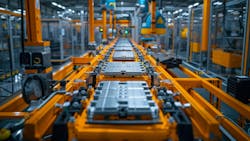DOE’s $3B Allocation Boosting 25 Advanced Battery Storage Manufacturing Projects throughout U.S.
The U.S. Department of Energy (DOE) has announced over $3 billion for 25 selected projects across 14 states to boost the domestic production of advanced batteries and battery materials nationwide.
The selected projects, administered by DOE’s Office of Manufacturing and Energy Supply Chains (MESC), will retrofit, expand, and build new domestic facilities for battery-grade processed critical minerals, battery components, battery manufacturing, and recycling. Once fully contracted, the portfolio of selected projects is anticipated to support over 8,000 construction jobs and over 4,000 operating jobs.
Through MESC, the Investing in America agenda will generate $16 billion in total investment for battery manufacturing and recycling through the Battery Materials Processing and Battery Manufacturing and Recycling Program.
The announcement of round two selections aims to address existing and future supply chain challenges. The selected projects cover strategic segments across the supply chain, building and expanding commercial-scale facilities to extract and recycle critical minerals including lithium, graphite, and manganese, as well as manufacture components.
The selected projects will also cover traditional and next-generation lithium-ion chemistries, as well as non-lithium-ion technologies, to ensure that the U.S. has a diverse portfolio of domestic battery technologies to strengthen the overall energy security.
Out of the selected projects, more than half have committed to or already have signed a Project Labor Agreement commitment and 10 have an agreement with labor or a neutrality pledge.
Overall, the private sector is investing close to $120 billion to bolster the U.S. EV supply chain. Battery storage companies such as Fluence Energy, FREYR, LG and AESC are relocating or building new manufacturing plants in the U.S. after stretched out global supply chains proved vulnerable during the COVID-19 pandemic.
Union partners represented across selected projects include NABTU (North America’s Building Trades Unions), Boilermakers, SMART International Association of Sheet Metal, Air, Rail, and Transportation Workers (SMART), Carpenters, Operating Engineers, UFCW (United Food and Commercial Workers International Union), IBEW (International Brotherhood of Electrical Workers) and the UA (United Association of Journeymen and Apprentices of the Plumbing and Pipe Fitting Industry of the United States and Canada).
About 90 percent of selectees are located in or adjacent to disadvantaged communities, advancing President Biden’s Justice40 Initiative, which sets the goal that 40 percent of the overall benefits of certain federal investments in climate, clean energy, clean transportation, and other areas flow to disadvantaged communities marginalized by underinvestment and overburdened by pollution.
Energy Storage is One of Many Paths to Net Zero
Track them by Subscribing to EnergyTech's Free E-Newsletter
About the Author
EnergyTech Staff
Rod Walton is head of content for EnergyTech.com. He has spent 17 years covering the energy industry as a newspaper and trade journalist.
Walton formerly was energy writer and business editor at the Tulsa World. Later, he spent six years covering the electricity power sector for Pennwell and Clarion Events. He joined Endeavor and EnergyTech in November 2021.
He can be reached at [email protected].
EnergyTech is focused on the mission critical and large-scale energy users and their sustainability and resiliency goals. These include the commercial and industrial sectors, as well as the military, universities, data centers and microgrids.
Many large-scale energy users such as Fortune 500 companies, and mission-critical users such as military bases, universities, healthcare facilities, public safety and data centers, shifting their energy priorities to reach net-zero carbon goals within the coming decades. These include plans for renewable energy power purchase agreements, but also on-site resiliency projects such as microgrids, combined heat and power, rooftop solar, energy storage, digitalization and building efficiency upgrades.
